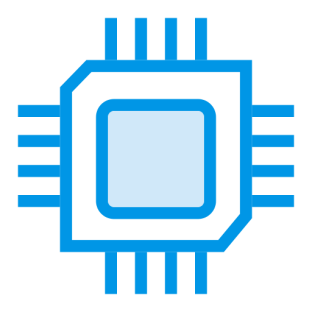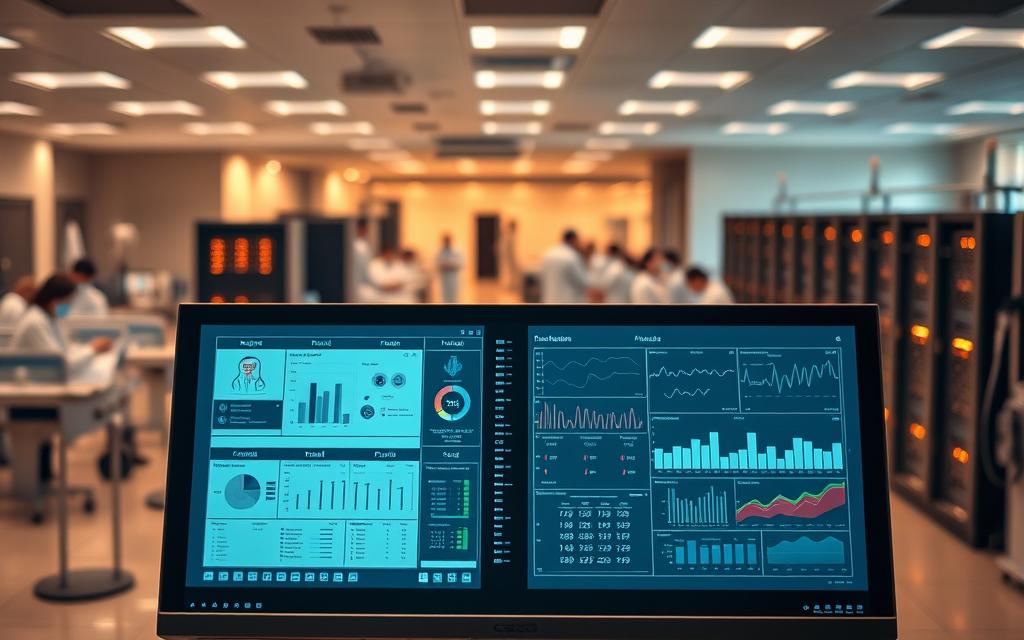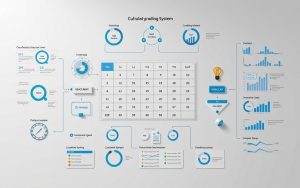Modern hospitals rely on advanced computer systems to improve patient care and efficiency. These systems form the backbone of healthcare IT. They enable faster diagnoses, better communication, and improved patient management.
The healthcare industry has seen rapid digital growth. Epic Systems Corporation leads the Electronic Health Record (EHR) market. They cover nearly 38% of U.S. hospital EHR installations.
Hospital computer systems now use complex tech for patient records and admin tasks. These platforms help manage vital info and reduce errors. They also improve patient outcomes through smart data analysis.
Healthcare IT is a network of tech solutions that enhance medical service delivery. These systems are crucial for all hospitals, from small rural clinics to big city medical centers.
Hospitals invest in secure, adaptable computer systems as technology advances. These systems can change with new medical practices and rules. The future of healthcare depends on these advanced tech platforms.
Understanding Healthcare Information Technology (HIT) Fundamentals
Healthcare information technology is the backbone of modern medical services. It transforms patient care delivery and management. This field integrates advanced hardware, software, and networking systems to revolutionize medical operations.
Healthcare information systems streamline patient care technology and boost medical efficiency. These systems generate significant economic impact. They potentially save $77 billion annually through operational improvements.
Core Components of Hospital IT Infrastructure
Hospital IT infrastructure includes several key technological elements:
- Electronic Medical Record (EMR) systems
- Clinical decision support platforms
- Network communication systems
- Data security protocols
- Patient management software
Key Functions of Healthcare Information Systems
The primary functions of HIT fundamentals include:
- Centralized patient data management
- Real-time information sharing
- Enhanced clinical decision-making
- Streamlined administrative processes
- Improved patient safety tracking
Impact on Patient Care and Safety
Patient care technology has dramatically changed healthcare delivery. Advanced health information systems offer many benefits.
- Reduced medical errors
- Faster diagnostic processes
- More personalized treatment plans
- Enhanced communication between healthcare providers
Healthcare information technology continues to be a crucial driver of medical innovation and patient-centered care.
The future of healthcare information technology is bright. Medical records and health information technician jobs are expected to grow 11% between 2018-2028.
Leading Electronic Health Record (EHR) Systems in Modern Healthcare

EHR systems have transformed healthcare technology. They’re now vital to modern medical infrastructure. By 2024, 96% of U.S. acute care hospitals will use certified EHR technology.
Several key players dominate the EHR software market. Each offers unique hospital EHR management solutions.
- Epic Systems (28.21% market share)
- Allscripts (9.21% market share)
- eClinicalWorks (6.57% market share)
- Athenahealth (6.03% market share)
Hospitals evaluate EHR systems based on crucial factors. These include:
- Interoperability with existing hospital systems
- Comprehensive patient data management
- Security and compliance features
- User-friendly interface
- Scalability and customization options
The EHR market is growing fast. It’s expected to top $46 billion by 2027.
Implementation usually takes 16 to 24 months. This requires careful planning and resources from healthcare organizations.
The future of healthcare lies in seamless, efficient, and secure electronic health record systems that empower both healthcare providers and patients.
What Computer Systems Do Hospitals Use: A Comprehensive Review
Hospitals rely on advanced information systems to streamline patient care and administrative processes. These digital platforms have transformed how medical institutions manage complex healthcare environments.
They improve operational efficiency and patient outcomes. The systems integrate various aspects of healthcare management.
Clinical Information Systems
Clinical information systems are the backbone of medical diagnostics and treatment. These platforms support critical healthcare functions through specialized modules.
- Laboratory information systems for precise test tracking
- Radiology information systems managing medical imaging
- Pharmacy management systems tracking medication workflows
Administrative and Billing Systems
Healthcare administrative systems are vital for hospital financial management. They handle complex billing processes, patient registration, and resource allocation.
| System Function | Key Capabilities |
|---|---|
| Patient Registration | Streamlined intake processes |
| Billing Management | Insurance verification and claims processing |
| Financial Reporting | Real-time revenue tracking |
Patient Engagement Platforms
Patient engagement technologies have changed healthcare interactions. Telemedicine systems and patient portals enable smooth communication between patients and healthcare providers.
These systems improve accessibility and convenience for patients. They offer various features to enhance the patient experience.
- Virtual consultation capabilities
- Personal health record access
- Appointment scheduling
89% of acute care hospitals in the United States use advanced electronic health record systems. This integration of technology continues to reshape medical service delivery.
Healthcare Data Management and Security Protocols
Medical data security is crucial in modern healthcare. Robust strategies ensure HIPAA compliance and protect sensitive records. With 84 million Americans using healthcare apps, data protection is more important than ever.
Hospitals use multiple security layers to safeguard patient data. These include advanced encryption, strict access control, and comprehensive audit trails. Continuous security monitoring is also essential.
The healthcare IT landscape is constantly evolving. EHR systems now feature sophisticated protection mechanisms. These go beyond traditional security approaches.
“Data protection is not just a technical requirement, but a fundamental patient right in modern healthcare.” – Healthcare Security Expert
Organizations must balance accessibility with security. Healthcare professionals need efficient access to patient information. At the same time, rigorous protection standards must be maintained.
The telemedicine market is growing rapidly. It’s expected to reach $64.1 billion by 2025. This growth highlights the need for strong medical data security protocols.
| Security Measure | Purpose | Implementation Rate |
|---|---|---|
| Data Encryption | Protect Patient Information | 95% |
| Multi-Factor Authentication | Restrict Unauthorized Access | 87% |
| Regular Security Audits | Identify Potential Vulnerabilities | 92% |
Healthcare data management continues to be a dynamic field, requiring constant adaptation to emerging technological challenges and regulatory requirements.
Emerging Trends in Hospital Information Systems
Healthcare tech is changing fast. New digital tools are improving patient care and medical operations. Three key trends are shaping the future of hospital IT.
Medical care is getting a tech upgrade. New tools are changing how doctors work and manage patient info. These advances are making healthcare better and more efficient.
Artificial Intelligence Integration in Healthcare
AI is opening new doors in healthcare. It’s helping with precise medicine and better diagnoses. Doctors are using smart computer programs to improve care.
- Enhance clinical decision support systems
- Predict patient risk factors
- Automate routine administrative tasks
- Develop personalized treatment plans
Cloud-Based Healthcare Solutions
Cloud systems are changing how medical data is managed. They offer safe and cost-effective options. These new platforms are making healthcare better in many ways.
- Real-time data access across multiple healthcare facilities
- Enhanced data security and compliance
- Reduced infrastructure costs
- Improved collaboration between healthcare providers
Healthcare Interoperability Advancements
Healthcare is breaking down old data barriers. New systems are creating connected networks. This helps doctors work together better.
- Enable smooth data exchange between different systems
- Support comprehensive patient health records
- Improve care coordination
- Enhance overall patient outcomes
“The future of healthcare lies in intelligent, interconnected systems that prioritize patient care and data accessibility.” – Healthcare Technology Institute
Hospitals are using these new tech trends. They’re making healthcare more personal and responsive. Patients will get better care as a result.
Conclusion
Digital transformation is revolutionizing healthcare delivery. It’s reshaping patient care, diagnosis, and treatment approaches. Technology advancements are improving operational efficiency and patient outcomes in healthcare systems.
Healthcare tech has reduced medical errors and improved diagnostic accuracy. CPOE systems have cut medication errors by 54%. This could save billions in costs and thousands of lives yearly.
The digital revolution in medical infrastructure promises better patient care. Electronic health records and telemedicine are becoming standard practice. Medical institutions must invest in tech solutions for patient safety and streamlined workflows.
Healthcare organizations need to adapt to emerging technologies. AI, machine learning, and medical informatics will drive future healthcare solutions. This will create more personalized and efficient medical experiences for patients.





My spouse and I absolutely love your blog and find most of your post’s to be exactly I’m looking for. can you offer guest writers to write content for you? I wouldn’t mind producing a post or elaborating on a lot of the subjects you write about here. Again, awesome blog!